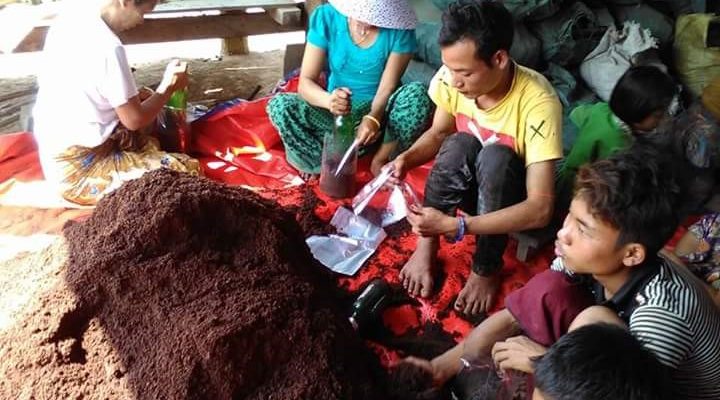Kachin, Myanmar – Win Oo is a young farmer, social activist, and social worker from Han Htet Village, Man Jai Township in Kachin State, Myanmar. He is also a member of AFFM (Agriculture and Farmer Federation of Myanmar) and a staff of Pan Pyoe Latt organization. Oo aims to be an active member of his community by helping people, particularly the youth.
AFFM partnered with NEED-Myanmar to train local youth on community development, agriculture, and environmental issues. With support from MTCP2-AFOSP Programme, AFFM has already sent a number of young farmers and leaders to undergo intensive training on sustainable agriculture at NEED. After learning about this, Oo expressed interest, and upon recommendation of Dr. Khum Win Thoung of AFFM, in 2014, Oo attended the training at NEED. He was excited for the rare opportunity to meet with people of different ethnicity from all over the country, as well as to learn, which will be a step closer to his goal.
After graduating, he went back to his community. He felt that the knowledge, skills, experiences, and techniques he gained from the training will make him a good trainer. He was appointed as a Tactical Supporter at his organization–a position that entails being responsible for providing training on organic farming, mushroom plantation, environment conservation, food security, and land law rights. He immediately went to work and conducted training in his community about these topics.
Moreover, Oo also conducted campaigns on pertinent issues such as food security and consumer rights. In Myanmar, there are a lot of food items containing chemicals. Oo and his organization conducted awareness campaigns to inform the people about the risks of consuming such foods. These campaigns are not just limited to his community. He also reached out to government schools to educate students about consumer rights and foods that are harmful to their health.
Aside from these activities, he also teaches mushroom and organic vegetable cultivation to the farmers in his community. During his free time, he tends to his mushroom plantation which is a source of extra income for him. He also spends some of his free time at the organic farm that he started with his organization.
Oo shared that there are many things he wants to change in his community including the use of chemicals in farming. He wants to conduct more campaigns to make people aware of the risks of consuming chemically-processed food products. He wants these kinds of food items to eventually disappear. He also wants to see farmers become self-sustaining. One of his immediate plans is to set up a model farm for organic farming to set as an example to the other farmers. #
About MTCP2
The Medium-Term Cooperation Program Phase 2 (MTCP2), a five-year capacity building program supported by the International Fund for Agricultural Development (IFAD), the Swiss Agency for Development and Cooperation (SDC), and the European Union (EU) , has been implemented in 22 countries across three sub-regions—Southeast Asia (through the ASEAN Farmer Organization Support Program-AFOSP-MTCP2), South Asia, and the Pacific—engaging 86 national federations of farmers organizations with 1,628 sub-national farmers organizations (FOs) with a total membership of around 43.5 million small-scale women, men and young farmers. The funding support (12 million USD) served as a catalytic fund that allowed FOs to enhance their capacity to engage in policy dialogues and to be effective channels of economic services to farmers. The program has contributed to the formation of strong national platform of FOs with improved capacity to engage in constructive policy processes and mobilize resources from mainstream agricultural development programs like extension services, credit, and pre and post-harvest facilities. The program also helped in re-structuring farmers’ associations into community-based social enterprises or as commodity-based cooperatives as well as consolidating FOs into agricultural cooperative federations/union to strengthen the role of small-scale farmers within an inclusive and sustainable value-chain. The program is being implemented by the consortium Asian Farmers’ Association for Sustainable Rural Development (AFA) and La Via Campesina (LVC).




Comments are closed